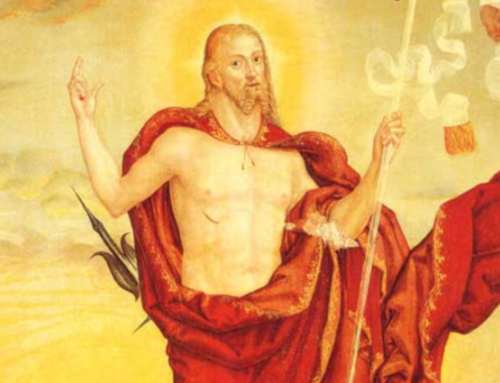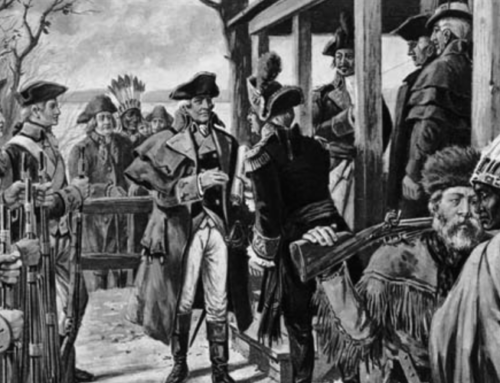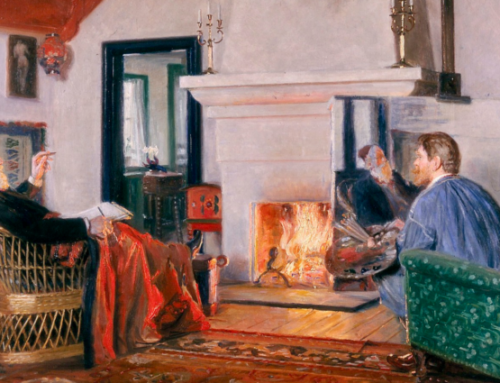In a previous post I argued something I believe most traditional conservatives understand in their bones: we will not “take back” our culture and way of life, or even preserve room within which to lead lives of decency and virtue, through any grand political effort to construct a national political coalition. The assumptions and very characters of too many Americans have been twisted too much for too long by our increasingly secular, individualist culture and our administrative and welfare state. Americans, as a people, no longer have sufficient character to govern themselves as citizens of a free and virtuous republic.
What, then, is a traditional conservative to do?
I have remarked many times that the good thing about a predicament like ours, in which we have been routed for decades in every sphere, is that there is no end of choices of where to begin working for improvement. It is vitally important, however, that we begin by getting our priorities in order.
To take yet another analytic step back (a process made necessary, I think, by just how far off the proper path we as a people have stumbled), setting the right priorities requires adopting the proper perspective.
It would be easy for me to say, at this point, that the proper perspective is that of eternity. The human person is meant for eternity, so all that matters, finally, is the state of our souls. And it would be wrong for me to say that this is too easy an answer, for one who takes such a position as seriously as it deserves. But not all of us are called to enter a cloistered life and the rest of us must face the fact that, for both good and ill, our surroundings affect our characters.
Though not of this world, we must live in this world, working in it, raising our children in it, and even worshipping in it. What is more, the permanent goods themselves—truth, beauty, and virtue, for example—exist for us in concrete objects, institutions, and practices. As one cannot know beauty save through, for example, an inspired, well-crafted work of art, one cannot know virtue save through the examples of good men and women who show their character through concrete acts of bravery, magnanimity, or charity.
No grand structure, no Great Society, can teach our children (or us) how to lead decent lives, doing unto others as we would have them do unto us. Even books and the utterly essential moral imagination they feed and inspire can do nothing to prevent formation of misshapen, abnormal characters if the reader has no living, breathing, human parents, teachers, and mentors on whose conduct to model his own.
It is not just pedagogically necessary to have face-to-face relationships, it is absolutely necessary for us to be happy that we share our lives with other people. And we will not be able to do this, will not even be able to live with others in peace, unless and until we are bound together by custom and tradition. Even with strangers it is a custom (rooted, to be sure, in natural law) of respect and charity or magnanimity that prevents the war of all against all; not all cultures are or have been good about dealing with strangers. Families, churches, and other associations are all the more dependent on traditions in ordering their common lives because the relationships within them are closer and more important.
As what is most important in ourselves is not our wealth or other worldly success, but our character, so what is important in our lives is the character of our relationships—the extent to which we lead lives of purpose and companionship with families, neighbors, and those with whom we share important goals. So…we live our lives through interactions with other people, within practices and traditions. Where does that lead us in terms of a “program of action?” It tells us, I think, what it is about which we should be, in the end, concerned. Rod Dreher has written movingly about the desire for a sacramental life, in which all things, from our food to our homes, to our religion, are recognized and lived as having spiritual meaning. Very few of us could live this way in all things all the time. But it shows, I think, the attitude we must bring to our consideration of priorities. All things are important in relation to how we lead our lives—to their capacity for helping us form and nurture a good life.
Many books, both good and bad, have been written on the nature of a good life, but for present purposes I think it best to concentrate on the fundamental imperative that we follow the Golden Rule—doing unto others as we would have them do unto us. That Golden Rule rests on personal relationships within traditions. One “does unto” someone else as one person to another. Our administrative state makes virtue extremely difficult because it replaces so many of our relationships with mechanical processes. Moreover, an essential element of doing unto others as one ought is treating them according to their reasonable (tradition-bound) expectations. Fraternal correction, for example, is a good and proper thing depending in part on the circumstances and the nature of any pre-existing relations. Telling your brother that he is treating your parents badly should be taken as a caring and necessary act. Telling a stranger at a restaurant that he is holding his fork in the “wrong” hand is not. One needs to be part of a community, with common customs, to have the basis on which to interact meaningfully.
All this may sound like nothing more than moralistic preaching about how we as individuals should conduct our lives. But it is intended as something more and different than that. For example, we know our government now undermines our ability to lead good lives. And the reason for that is its rejection of its proper role as a community of communities—as a guardian of the more fundamental associations in which we live our lives. Today the state too often is a structure that works to replace and even destroy communities on the grounds that they fail to recognize abstract, ideological values and demands for ever-increasing material security and well-being. Thus, the primary question we face in considering public life concerns how we are to protect and nurture, in a hostile environment, the associations in which alone people can flourish.
We see, then, the first traditional conservative priority, that of flourishing associations. In addition, however, these considerations highlight the need to think in terms of a way of life, rather than some static good such as wealth, in considering which particular structures and relationships to support and how.
I will address specific goods in succeeding posts. I doubt the list will come as a surprise to many, focusing as it does on family, church, and local association. But it is important to note the ways in which these goods are to be pursued should be determined in largest measure by their relevance to a good life.
By way of illustration, conservatism is about place, about where we live and the people with whom we live our lives. Thus it is not surprising that Russell Kirk, author of scores of important works, held but one public office during his lifetime—that of local justice of the peace. This was a position in which a man of profound moral imagination could influence the lives and characters of his neighbors—those with whom he interacted regularly and face-to-face—in a positive way. Yet, Kirk was not only a justice of the peace. He was not so bound up with tactile, experience that he lost sight of the wider world, with its dangers, influence, and necessity for a full life. He travelled extensively, wrote for an international audience, and sought out our tradition’s roots and cues in far-off lands and times.
Catholics especially should be familiar with the need to integrate the universal with the local and particular, and to look to both for guidance. We are part of a universal church, with a Pope in Rome, yet lead most of our spiritual lives in our local parish. Indeed, it is a particular problem for many Catholics that they must “shop around” for priests and parishes committed to a reasonably orthodox practice of the faith and so sometimes worship far from home. My own family drives fifteen minutes to mass rather than travel five minutes to sit in a warehouse and watch “liturgy in motion.”
This problem of “shopping around” shows both how difficult it is to lead a local life today, and that there are real limits to the purely geographic definition of “place.” I would posit as a necessary goal a more integrated life of work, schooling, and leisure, in which families can spend the bulk of their time in proximity to one another, rather than in their cars. That said, movement happens, and we should not pretend that our neighborhoods, wherever they may be, have all the resources we need for good lives. Suburbanization has been around far too long and has had far too much of an impact on where and how we live for many neighborhoods to retain the elements of a full life.
So what do we do? Rather than make an idol of the locality itself, we have to participate in at least some of its many, often highly frustrating, associations while also trying to influence local decision making, and also working to improve the ways in which we build and govern local communities. In part this requires patient, local involvement, in part it requires looking to outside or national groups (and even internet resources, though I resist the notion of an “online community”) for help. As important, however, are an attitude and a framing of issues so as to see for ourselves and present to others our real, common goal of leading good lives.
Books on the topic of this essay may be found in The Imaginative Conservative Bookstore.








Some exceptionally fine thinking here, please continue your very useful analysis!
As preparation for Dr. Frohnen's next posts, I suggest that one may read the last chapter of P.J. O'Rourke's Parliament of Whores. Anyone who has spent a lifetime at City Council meetings, or New England Town Meetings, or has been a member of a town or county commission will recognize the responsibility and the high comedy.
Thanks, John. A highly useful suggestion, and highly relevant to any serious discussion of local politics–the subject of an essay I'll post soon. O'Rourke truly is one of our greatest analysts of political and human nature. He also is the man I would most like to be–or at least whose books I would most like to have written. I've never had the guts to go the whole O'Rourke, though I've mapped out more than one O'Rourkean book. Who knows? One day I may actually write "The Gelded Age.". . .
“Americans, as a people, no longer have sufficient character to govern themselves as citizens of a free and virtuous republic.” Indeed and most of the potential narratives are closed to us. But a wild card still exists and that is a catastrophic resetting of society~a Noah event. With the loss of effective antibiotics, lose nuclear weapons, mad mean governing WMDs and natural disasters, we would all be looking to the heavens for deliverance and seeking wisdom..